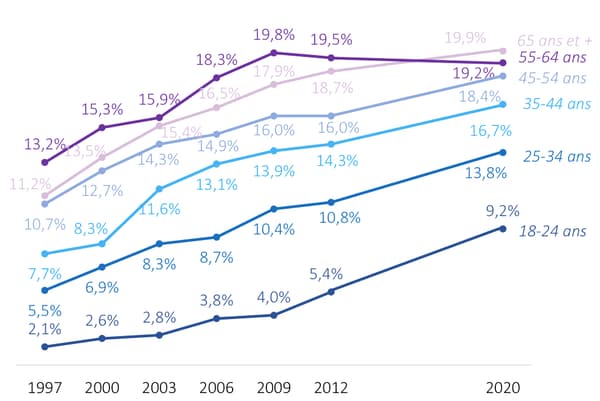The proportion of obese French people has continued to rise in recent years, with a particularly marked rise among younger adults, researchers conducting a landmark study on the subject reported Monday. Obesity is experiencing “a sharp increase in the younger age groups,” summarized Annick Fontbonne, an epidemiologist at Inserm, during a press conference.
According to their results, almost half of the French, 47%, are obese or overweight. Among them, a sixth of the French (17%) would be obese, that is, at a weight level considered unhealthy rather than simply overweight.
The study was carried out on the proportion of obese or overweight adults in France in 2020 and was carried out through a survey of about 10,000 people representative of the population.
18-24 years of age particularly affected
This study is a reference on the subject of obesity and overweight in France, since it has been carried out periodically since the late 1990s. It is therefore interesting to assess the evolution of obesity and overweight. However, if the latter tends to stabilize or even decrease for a decade, obesity continues to affect more and more French people.
These results were already common knowledge, as they had been made public last year by the League Against Obesity, an association that relaunched this study after a period of inactivity. But now they are the subject of a publication in a magazine, the Journal of Clinical Medicineand meanwhile, the researchers were able to refine their conclusions.
Therefore, they noted that the rise in obesity particularly affected young people aged 18 to 24. The latter are, in absolute terms, the least affected age group with one tenth -9.2%- of obese, but this proportion has quadrupled in the last twenty years.

Another notable conclusion, obesity is more or less common depending on the region: it affects more than 20% of the people surveyed in Hauts-de-France or Grand Est. This geographical distribution corresponds in particular to socioeconomic realities, and the most poor tend to be more affected.
“People aren’t ‘addicted’ to bad food, but are encouraged to buy it because it’s cheaper,” says Annick Fontbonne. “Good quality food, food that is said to be healthy, is generally more expensive.”
Source: BFM TV

